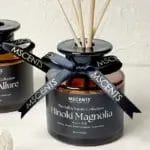
Blog – Scenting Tips & Insights
How the Power of Scent Marketing Influences Consumer Behaviour and Boosts Sales

Marketing techniques have developed in recent years. Print advertisements, radio advertisements, and television commercials still hold significance, yet novel approaches such as scent marketing have emerged.
Scent marketing involves deploying thoughtfully chosen fragrances to cultivate positive affiliations with a brand and impact customer behaviour in shops. Aromas have the ability to elevate shoppers’ dispositions, improve the in-store experience, and ultimately increase purchases.
What is Scent Marketing?
Scent marketing refers to strategically using selected fragrances to positively associate with a brand. It involves introducing pleasing aromas in retail environments, products, and promotional materials to impact consumer behaviour and enhance sales performance.
Effectively implementing scent marketing can result in a more memorable brand interaction and recall for customers. When executed correctly, it has the potential to increase transactional values, heighten customer satisfaction, and cultivate a more pleasant atmosphere within physical retail locations.
The Impact of Scent Marketing on Consumer Behavior
Enhancing the Customer Experience
Aromas create an uplifting atmosphere for customers in retail establishments. Fragrances carefully aligned with a store’s branding can elicit emotions and recollections that make shoppers feel more serene and at ease.
Customers are inclined to spend additional time in outlets imbued with pleasant ambient scents, increasing their engagement with products and in-store displays. These fragrances furthermore instil a perception of freshness and cleanliness, cultivating an overall positive perception of the surroundings amongst customers.
Evoking Emotions and Memories
Certain scents possess the capability to evoke potent emotions and awareness that unconsciously sway customers’ purchasing resolutions. Pleasant aromas can trigger positive sentiments that render patrons jubilant and relaxed, placing them in a more receptive frame of mind. Nostalgic and distinct fragrances are likewise able to activate memories from the past, cultivating an emotional bond that attracts clientele to specific goods or brands.
For instance, the odour of vanilla or baked goods can remind individuals of comfort and warmth, whereas the scent of flowers can evoke feelings of joy and tranquillity. These emotional responses, whether conscious or unconscious, shape customers’ perceptions and attitudes toward products and establishments. Fragrances that patrons find pleasant and familiar are prone to produce positive assessments that augment their willingness to spend time browsing and making purchases.
Increasing Dwell Time
It has been found that pleasant fragrances in retail outlets correlate with customers spending additional time exploring and making purchases in those locations. When customers find the ambient fragrances to be relaxing and pleasant, they have a tendency to remain within the retail environment for extended durations. The extended dwell time increases customers’ exposure to products and displays, often resulting in higher sales and revenue for the store.
Strengthening Brand Identity
A unique scent can reinforce a brand’s recognition and loyalty in several ways. First, a signature fragrance allows customers to easily identify and recall the brand. When customers smell that distinctive scent, it automatically brings the brand’s image, products, and experiences to mind. This makes the brand more memorable and recognisable.
Second, a signature scent becomes associated with the positive emotions and feelings customers have when interacting with the brand. When customers re-encounter that same fragrance later, it reactivates those positive brand associations and feelings of familiarity, comfort, and trust. This emotional connection strengthens customers’ loyalty to the brand.
Types of Scent Marketing Strategies

Ambient scenting to create a welcoming atmosphere by using general pleasant fragrances that fill the entire retail space. This could involve using light floral scents or baked good aromas.
- It is crucial for brands to develop a signature scent that aligns with and conveys the core values and personality of the organisation. This could involve creating a bespoke fragrance specifically for the brand to make the scent easily recognisable and memorable.
- Ensuring a consistent smell across all retail sites and areas is important. Various odour diffusion methods and scent distribution systems should be utilised to maintain the signature fragrance throughout a company’s physical premises. This ensures customers have a similar smell experience every time they visit.
- Creating seasonal scents that promote specific sales events, holiday periods and product launches. Holiday fragrances like pine or cinnamon during Christmas, or baked goods smells during the back-to-school season can signal particular promotions and events to customers.
- Personalising scent experiences based on customer demographics by tailoring different fragrances for different age groups or customer segments that match their preferences. For example, lighter scents for younger customers and more complex aromas for older demographics.
The Bottomline
Scent plays a powerful role in influencing consumer behaviour and boosting sales, beyond just visual aspects in retail. Through considered implementation of scent marketing strategies, brands can generate more memorable and evocative customer experiences that reinforce brand identity and loyalty. Ready to create a more memorable and welcoming space with the power of scent? MScents offers varied solutions to explore. Working with us allows selection from a wide range of calming and energising fragrances, matching the needs of both your brand and customers.








